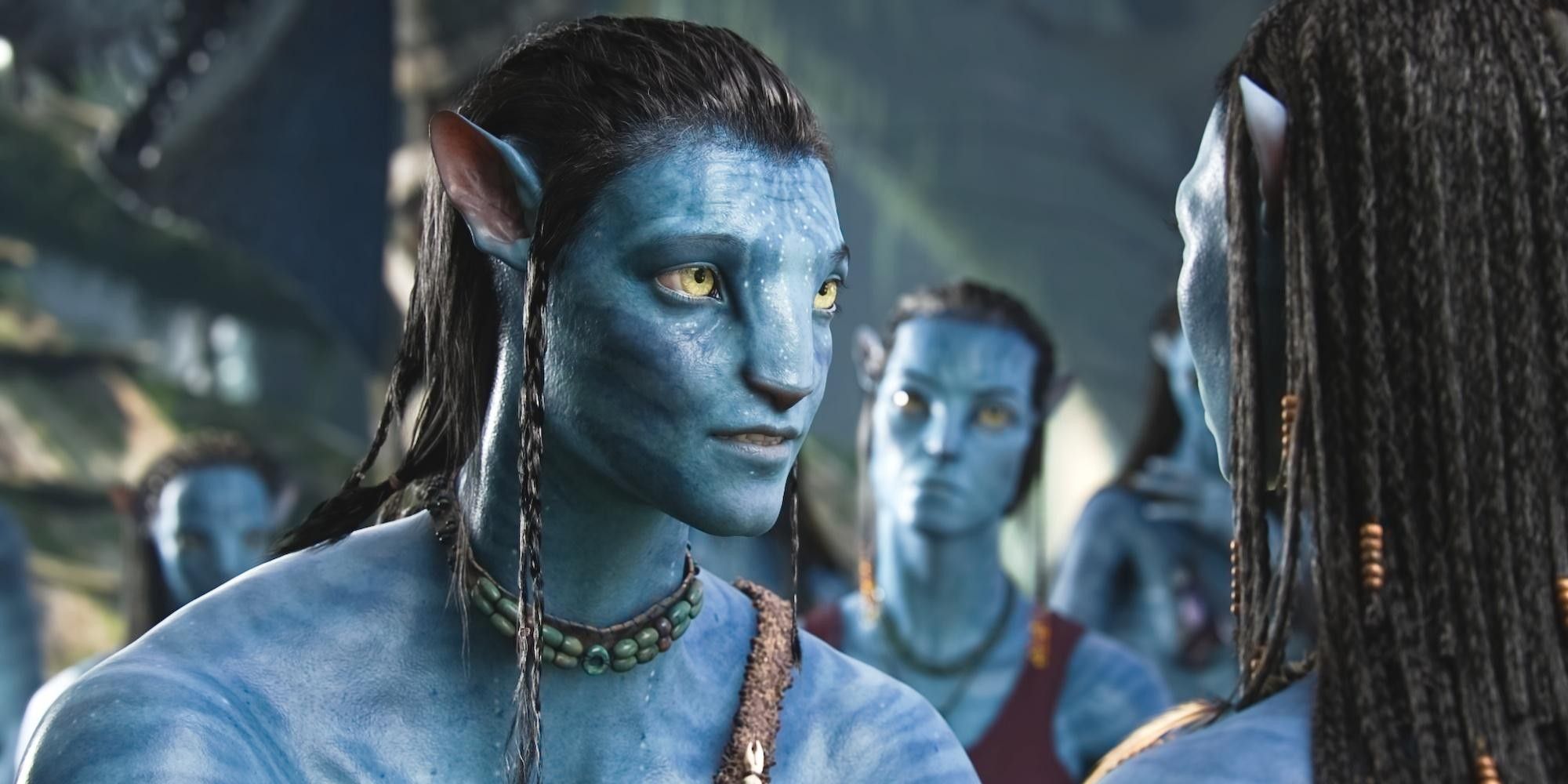James Cameron’s Avatar is one of the highest grossing movies of all time, so why does it provoke such divided opinions? Love it or hate it, Avatar is an undeniably important chapter in the history of modern cinema. James Cameron has always been a filmmaker looking to push the envelope of the technically possible, and Avatar was an idea that existed as early as the Titanic days. Alas, it would take another decade before technology caught up to Cameron’s imagination and the medium of film was able to bring to life what the box office-busting director was imagining.
Set on the faraway moon of Pandora, mankind has discovered a rich source of the (very obviously) fictional substance known as unobtainium, but the locals are unwilling to shift. A team of humans from scientific and military backgrounds are drafted in to integrate with the blue Na’vi tribes using synthetic avatar bodies and, ultimately, send them packing, but the ploy backfires when Jake Sully and the expedition’s science folk rebel and side with the indigenous population.
Avatar was a roaring success upon release and talk of up to 4 sequels began almost immediately, but with Cameron looking to advance the possibilities of underwater filming on Avatar 2, production is still ongoing. Strangely, however, the public’s perception of Avatar has evolved considerably over those intervening 11 years, and the film now very much resides in the “love it or hate it” category. But how can a film that spent a decade as the undisputed king of the box office become so divisive?
Avatar Was A Huge Box Office Success

Avatar‘s incredible financial performance is no secret, with Jake and his new friends smashing numerous records on the way to becoming the highest grossing movie of all time. Only the combined might of the MCU in 2019’s Avengers: Endgame was able to topple James Cameron’s blue blockbusters, and even then Avatar was at a disadvantage due to inflation. Grossing $2.7 billion worldwide, Avatar‘s takings were astronomically high, far beyond what could’ve been predicted of an original science fiction feature. Avatar‘s lucrative haul was certainly boosted by the higher ticket prices theaters set for 3D and IMAX viewers. James Cameron designed Pandora to be viewed through a ridiculous pair of novelty glasses on the biggest screen feasible, and this meant viewers were paying a premium for a single ticket, but even taking this factor into consideration, Avatar was a phenomenal smash hit.
It’s far from a coincidence that the final film Avatar passed on its long climb to the top of the all-time box office ranking was James Cameron’s own Titanic. The icy waters of the Atlantic may be worlds away from the alien jungles of Pandora, but both films marry together unrivaled spectacle with universal themes, ensuring the widest possible appeal, even by Hollywood blockbuster standards. Avatar and Titanic both dabble in the same emotions and follow a similar underdog storyline where man’s hubris towards nature becomes its undoing. Having found a winning formula with Titanic, Cameron conjured up another forbidden romance story, sprinkled in some sci-fi and watched the cash roll in once again.
Avatar’s Reputation Has Got Worse Since Release

Financial success is one thing, but often overlooked is how strong Avatar‘s critical and fan reaction was upon release in 2009. Almost every major outlet gave Avatar glowing 4 or 5 star reviews, and big name fellow filmmakers queued up to express their amazement at this landmark release. Fan consensus was also overwhelmingly positive, with sci-fi aficionados and casual movie fans alike rushing to heap praise upon James Cameron’s latest offering. There was certainly a smattering a criticism among early reactions to Avatar, but nothing that could come close to being labelled divisive.
And yet in 2020, Avatar is almost considered a guilty pleasure, with some reluctant to even admit in public that they still get a kick out of visiting Pandora. Part of this drastic fall from grace comes from Avatar‘s runaway success. Whether it be film, literature, music or video games, popularity breeds contempt, and Avatar was about as popular as they come – it was only natural that the tide would eventually turn. But Avatar‘s slowly souring reception isn’t simply down to social habits; Cameron’s most successful film has not aged particularly well since 2009, and this can be partly attributed to the theatrical release’s heavy focus on 3D technology.
While reviews of the day did praise Avatar‘s story and characters, emphasis was firmly on how much the film impressed visually – no surprise, since this is exactly what Cameron intended to achieve with his richly detailed world and stunning motion capture performances. The novel approach blew audiences and critics away on first viewing, but that early buzz came at a cost, since Avatar could only be enjoyed in its natural theatrical habitat for a limited time. Once fans got their DVD copy a few months later, watching Avatar was a markedly different experience. Now, a full decade later, the full, wondrous 3D impact of Avatar has been long forgotten, and along with it a sizable chunk of the appeal Cameron’s biggest movie once held.
Why James Cameron’s Avatar Is Divisive

The fading novelty of 3D explains why Avatar isn’t as popular as it used to be, but that doesn’t necessarily account for how Cameron’s man vs. nature tale become so polarizing. Story seems to be the biggest sticking point among Avatar‘s increasing number of detractors. Even in 2009, it was widely acknowledged that Avatar‘s plot was not especially complicated, but this didn’t matter when there so much for the eyes to feast on. Film history clearly shows, however, that timeless classics are created not through stunning visuals and technological advancement, but through a compelling story, and as Avatar‘s visual appeal has faded from a burning fascination to simmering interest, audiences soon found the flaws in Cameron’s story stood out far more than they did in theaters. Without the bells and whistles, Avatar‘s plot is by-the-numbers Hollywood fare and the characters as cookie-cutter as they come. Of course, shifting opinion wouldn’t knock Avatar from its spot as the most financially successful movie in history, and there’s perhaps a sense of resentment that a film so heavily reliant on visuals became an unmatched success, while arguably more deserving releases of the 2010s passed by without celebration.
Another key reason for Avatar‘s divisiveness rests in its moral message. At its core, Avatar is a story of environmental preservation, and of nature triumphing against the greed of man. While there’s nothing inherently wrong with incorporating a green message into a blockbuster production, Avatar‘s allegory is neither subtle nor nuanced. Even the most feverish eco-warrior might feel like they’d be subjected to a thorough preaching. Once again, this is a flaw that the amazement of 3D and the excitement of seeing the Na’vi for the first time sugar-coated on first watch, but without that mask, Avatar‘s shallow dive into eco-friendly sentiments are exposed.
Avatar has also been accused of wheeling out tired and problematic Hollywood tropes, adding fuel to the idea that the film has aged poorly. In addition to the environmentalism, Cameron’s story explores the topic of colonization and the slaughter of a native people by a violent invading force. It’s a parallel that has been used in science fiction ad nauseam, but Avatar digs itself into a hypocritical hole by reverting to the “white savior” stereotype. Jake Sully, a white human male, swoops in to solve the problems of an alien species and even proves himself to be the most useful member of their own race when bonding with a supposedly uncontrollable beast. The fact that the Na’vi are a very transparent representation of Native Americans does not help. With its overt environmental message and commentary, Avatar succeeds in upsetting conservative types, but the way Jake Sully immediately adopts Na’vi culture better than the Na’vi themselves doesn’t exactly endear Avatar to a liberal audience in 2020 either, meaning the entire political subtext (and that’s a very loose “sub”) falls flat.
How Cameron’s Avatar Sequels Could Change Opinion Again

The world might have fallen out of love with Avatar, but that won’t stop the upcoming quartet of sequels dominating the box office throughout the 2020s. There’s little doubt that Avatar 2 will be a huge hit and make a ton of cash, but the real question is whether or not James Cameron can once again capture the imaginations of his broad audience and win back those who have turned on the original Avatar. The return of the Na’vi will likely go one of two ways – either Avatar 2 highlights the misfires of the original and is subjected to a decade’s worth of pent up cynicism, or the groundbreaking underwater setting reminds everybody why Avatar was so popular in the first place, and Cameron fever lurches into gear once again.
Perhaps he most interesting aspect of Avatar‘s return will be whether or not the sequel addresses the criticisms aimed at Avatar in more recent reappraisals. Having already been introduced to the world and characters, will the follow-up find a more pleasing balance between out of this world imagery and genuine depth of character and story? Cameron is unlikely to back down on his environmental metaphor, but can the director integrate that message more deftly that before? Along those same lines, will Avatar 2 exercise more awareness when it comes to the conflict between western industrialism and the more primitive Na’vi tribe? The world eagerly awaits to see whether Avatar 2 can prove the doubters wrong, or whether CGI will be the only thing that James Cameron updates.
Key Release Dates
Avatar 2: The Way of Water
Release Date:2022-12-16
Avatar 3
Release Date:2025-12-19
Avatar 4
Release Date:2029-12-21
Avatar 5
Release Date:2031-12-19





